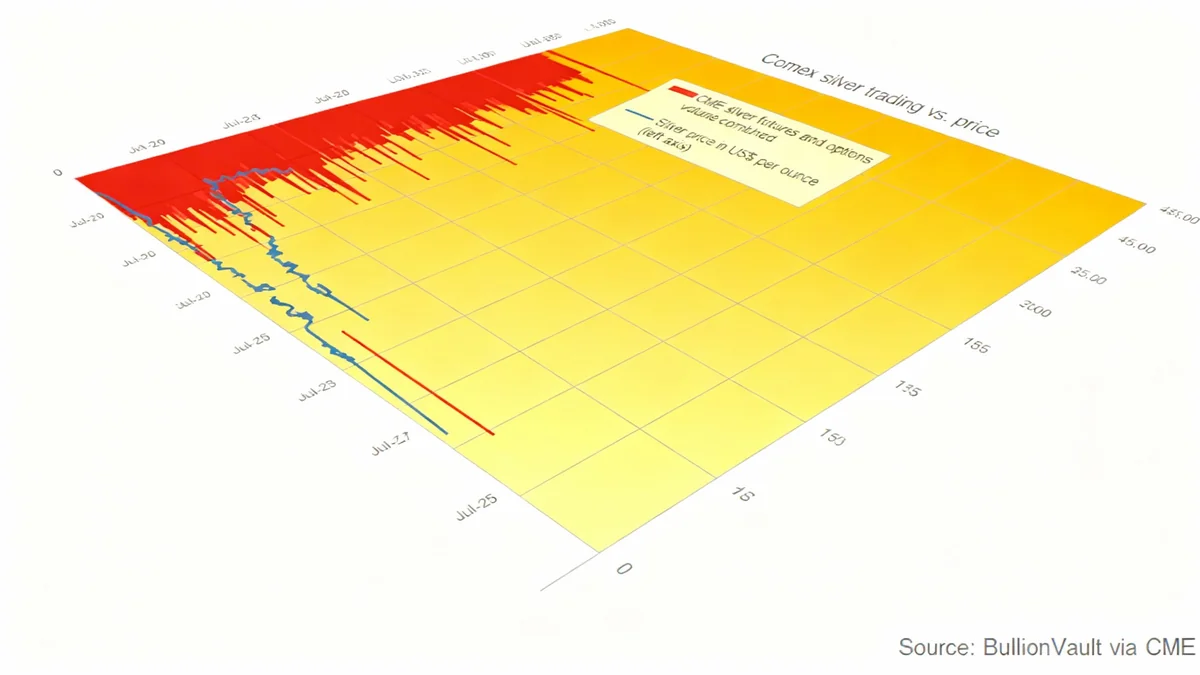Shares of data analytics firm Palantir Technologies Inc. (PLTR) have entered a technical correction this week, falling more than 15% from a record high set on Monday. The sharp decline occurred even after the company reported strong third-quarter financial results that surpassed analyst expectations.
The stock's volatility highlights a growing debate between bullish analysts and prominent short-sellers over the valuation of artificial intelligence companies, with Palantir's CEO Alex Karp publicly defending his company against critics.
Key Takeaways
- Palantir's stock dropped over 15% from its recent peak, officially entering a technical correction.
- The downturn happened despite the company reporting a 63% year-over-year revenue increase in its third quarter.
- Investor Michael Burry has taken a significant short position against the stock, citing an AI bubble.
- Palantir CEO Alex Karp and analysts like Dan Ives of Wedbush remain highly optimistic about the company's future.
A Week of Contrasting Signals
Palantir's stock performance this week has presented a puzzle for investors. On Monday, the share price reached an all-time high of $207.52. However, by Thursday, the stock had fallen to $175.05, a decline of 15.64% from its peak.
A drop of 10% or more from a recent high is defined by market analysts as a technical correction. This suggests a shift in investor sentiment, often driven by profit-taking or broader market concerns, but does not necessarily signal a long-term bear market, which requires a decline of 20% or more.
This price action is particularly noteworthy because it followed a strong third-quarter earnings report. The company announced revenues of $1.18 billion, a 63% increase compared to the same period last year. Its profit of $0.21 per share also comfortably beat consensus estimates.
The Battle Between Bulls and Bears
The recent pressure on Palantir's stock has been amplified by high-profile bearish sentiment. Investor Michael Burry, known for his role in predicting the 2008 financial crisis, revealed a substantial bet against the company. Burry purchased 5 million put options, valued at approximately $912 million, signaling his belief that the stock's price will fall.
Burry has publicly voiced concerns about what he describes as bubble dynamics currently prevailing among AI-related stocks.
What is a Put Option?
A put option gives the holder the right, but not the obligation, to sell a stock at a predetermined price within a specific timeframe. Investors like Michael Burry buy put options when they anticipate a stock's price will decrease. It is a common strategy for short-selling or hedging a portfolio.
However, this view is not universally shared. Dan Ives, an analyst at Wedbush Securities, has countered Burry's position, stating he is “dead wrong.” Ives remains optimistic, pointing to the explosive growth in Palantir's U.S. commercial business. He projects this segment alone could become an opportunity “bigger than the company itself today” within the next three years.
CEO Alex Karp Defends Company Culture
Amid the market debate, Palantir CEO Alex Karp has directly addressed the criticism. During an appearance on The Axios Show on Thursday, Karp expressed strong confidence in his company's unique position and value.
“We have the most baller company on the planet,” Karp stated, arguing that conventional analyst models fail to capture the intrinsic value of Palantir's products and corporate culture.
His comments suggest that the company's leadership believes its long-term potential is misunderstood by critics who are focused on short-term market fluctuations or traditional valuation metrics.
Palantir's Q3 Performance at a Glance
- Revenue: $1.18 billion (up 63% year-over-year)
- Profit: $0.21 per share
- Market Reaction: Stock declined over 15% from its peak in the same week.
Market Outlook and Stock Movement
Despite the significant pullback, Palantir's stock showed signs of stabilizing. After closing down 6.84% on Thursday, it saw a modest gain of 1.37% in overnight trading. The stock continues to score highly on momentum and growth metrics, indicating a favorable price trend in the short, medium, and long term according to some ranking systems.
The current situation places Palantir at the center of a larger conversation about AI valuations. Investors are now weighing the company's impressive growth and strong financial performance against concerns of an overheated market and the bearish outlooks from influential figures like Michael Burry.
The coming weeks will likely determine whether this technical correction is a temporary setback or the beginning of a more significant trend for one of the market's most-watched AI stocks.





